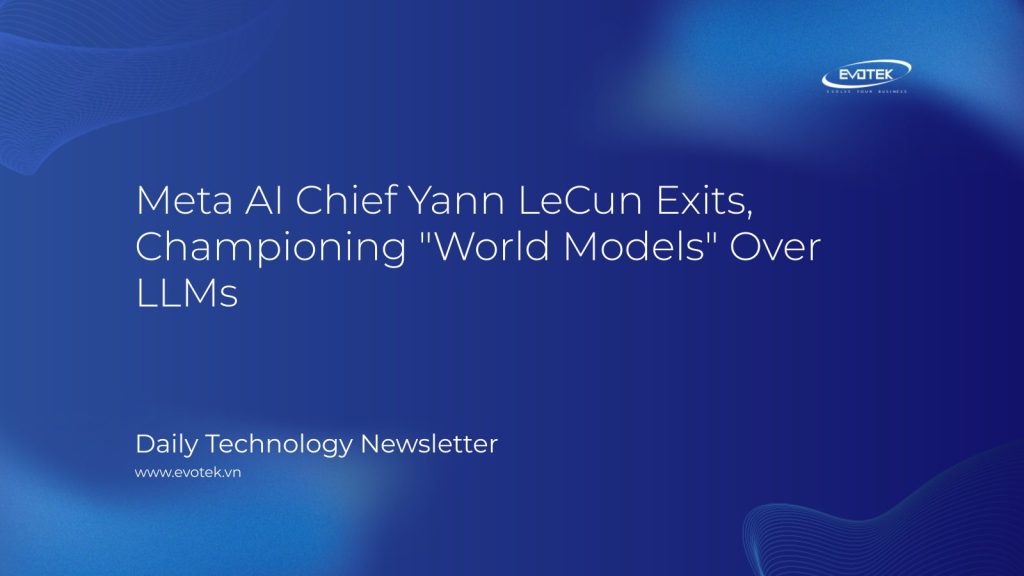One of the artificial intelligence world’s most influential figures, Yann LeCun, Meta’s chief AI scientist, is reportedly preparing to step down. LeCun, a pioneer in deep learning and a prominent voice in AI research, is said to be departing due to a fundamental disagreement with the current industry-wide focus on Large Language Models (LLMs), which he dismisses as a “dead end” for achieving true human-level intelligence. Instead, LeCun is advocating for a revolutionary shift towards “world models.”
The AI Visionary’s Departure and Disillusionment with LLMs
At 65, Yann LeCun holds an elder statesman status within the AI community, having enjoyed vast resources at Meta’s “fundamental AI research” division. His impending resignation, corroborated by multiple credible reports, comes at a time when Meta, like many tech giants, is investing heavily in AI, acquiring top talent, and even, according to CEO Mark Zuckerberg, nearing “superintelligence.”
However, LeCun has long hinted at his skepticism. He has become famously critical of current LLM architectures, stating as early as April last year that “an LLM is basically an off-ramp, a distraction, a dead end.” This stance has led to some controversy, with critics like Gary Marcus pointing out a perceived flip-flop after LeCun previously defended LLMs. Nevertheless, LeCun’s conviction is clear: simply scaling up existing LLMs will not yield genuine intelligence.
Internal Shifts and the Rise of LLM Advocates
A recent Wall Street Journal analysis suggests potential internal dynamics contributed to LeCun’s decision. This past summer saw Alexandr Wang, 28, co-creator of the LLM-based sensation ChatGPT, appointed head of AI at Meta, effectively becoming LeCun’s superior. Additionally, Shengjia Zhao, another relatively young chief scientist touting “breakthroughs” in scaling, joined Meta above LeCun this year. These appointments highlight a strategic pivot within Meta towards the very LLM scaling approaches LeCun has lost faith in. Meta’s AI operation is described as having an eccentric organizational chart, comprising multiple, separate groups, which saw hundreds laid off last month in an effort to streamline.
“World Models”: LeCun’s Alternative Pathway to Advanced AI
Reports from the Financial Times indicate LeCun may establish a new startup dedicated to developing “world models.” He has been consistently vocal about why these models hold the key to the future of artificial intelligence. In a detailed speech at the AI Action Summit in Paris, LeCun, who worked on Meta’s smart glasses but less so on its Llama LLM, emphasized the critical need for future AI, especially in wearables, to understand the world as humans do.
He argues that current LLMs “can’t even reproduce cat intelligence or rat intelligence, let alone dog intelligence.” Animals, he contends, perform “amazing feats” because they comprehend the physical world, plan complex actions, and possess causal models. This fundamental understanding is what LeCun believes LLMs lack.
The “Rotating Cube” Thought Experiment
To illustrate this limitation, LeCun offers a compelling thought experiment:
“If I tell you ‘imagine a cube floating in the air in front of you. Okay now rotate this cube by 90 degrees around a vertical axis. What does it look like?’ It’s very easy for you to kind of have this mental model of a cube rotating.”
While an LLM can readily generate a description, it cannot truly “interact” with the cube mentally or physically. LeCun attributes this to the inherent difference between text data, which LLMs are trained on (equivalent to 450,000 years of reading), and the vast sensory data (sight, touch) a child processes in just a few years (estimated at 1.4 x 10^14 bytes). This abstraction underscores his belief that LLMs are fundamentally limited in ways that world models aim to overcome.
Designing the Future of AI: LeCun’s Vision
LeCun envisions world models that maintain a current “estimate of the state of the world” through abstract representations. Unlike the sequential, tokenized predictions of LLMs, his ideal model would “predict the resulting state of the world that will occur after you take that sequence of actions.”
These sophisticated systems, he believes, will empower computer scientists to build AI capable of hierarchical planning, reasoning, and inherently more robust safety features. Rather than being “mysterious black boxes” refined through fine-tuning, world models would have their control mechanisms built directly into their architecture.
LeCun suggests that while classical AI, like search engines, reduces problems to optimization, his world model would seek compatibility between different states of the world, identifying efficient solutions using an “energy function that measures incompatibility.”
A Moonshot on the Horizon?
While LeCun has already begun exploratory work on world models at Meta, his precise next steps and the launch of a new venture remain unconfirmed. His public statements, though detailed, paint a picture of an ambitious “moonshot” – a quest for a breakthrough on par with ChatGPT, but in a fundamentally different direction. Such an endeavor would undoubtedly require significant time, immense investment, and could take years, or even longer, to yield truly remarkable results.
This potential shift by one of AI’s leading minds marks a pivotal moment, challenging the dominant paradigm and opening new avenues for the future of artificial intelligence research.

 日本語
日本語 한국어
한국어 Tiếng Việt
Tiếng Việt 简体中文
简体中文